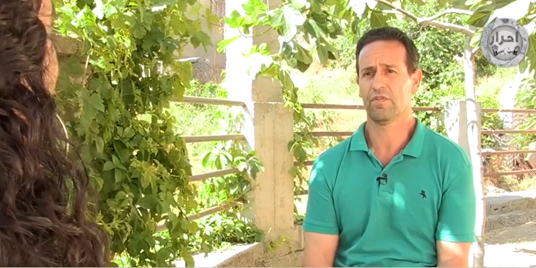“I was a racist. I disliked Arabs, detested and hated them.” Abdel-Nour, a pastor in the Kabyle region of Algeria, is opening up to Free Souls presenter Samia Kessai about the hatred that once consumed him.
Until 2016, his own language, the Kabyle version of Tamazight, was not even an official language in his country. As a young Berber, or Amazigh, he resented this and the national policies that made his people second-class citizens.
“At school my marks were not good in Arabic because I hated it and refused to learn it. So I dropped out of school,” he says. “At home, when I saw my sisters watching films in Arabic, I turned off the TV.”
Growing up in a society where Amazigh people were neglected and sometimes experienced violence from Arab rulers, Abdel-Nour spent his childhood and teenage years carrying hatred.
Second class
Nor was Abdel-Nour alone in this. Several Amazigh uprisings and the number of political parties and cultural movements that represent their calls to be heard and recognised show their strong identity. This is a people who have faced marginalisation for centuries. Even the name “Berber”, derived from the Roman word “barbarian”, is derogatory. The alternative, Amazigh, means “free people”.
After the Arab conquests of the 7th century, Arabic culture and language became dominant. In Algeria – home to over 12 million Amazigh – little changed under 132 years of French rule. After independence in 1962, the new nationalist government also followed an Arabist agenda. Kabyle leaders who had taken part in the war of independence resisted the new government in two years of conflict. Over 400 Kabyle lives were lost and prominent Kabyle leaders were exiled or executed.
It took two Amazigh uprisings in 1980 and 2008 before Algeria agreed to offer Tamazight language teaching in the Kabyle region of Algeria. Tamazight received official recognition only in 2016. In neighbouring Morocco, change for the nation’s 20 million Amazigh came just slightly earlier. In 2001 King Mohammed Vl declared Amazigh identity “a major element of national culture and heritage” and Tamazight was designated an official language in 2011.
For Abdel-Nour, the humiliation was close to home. He saw an older brother beaten for writing in Tamazight and witnessed his mother burning his brother’s documents in fear for his life.
All change
But God had other plans for Abdel-Nour: to be a messenger of reconciliation and love even to his Arab enemies. His previous image of God was that He was severe and cruel. But when he met some people from a local church, things began to change.

“They did not stop talking about Jesus Christ,” he recalls. “I was a curious person, so I went with them to the church. I noticed that their faces were shining with love, a love I hadn’t even experienced in my family.”
In this first visit, he says he saw that “This God is a loving God” and “I felt joy flooding my heart, but I did not realise who Jesus Christ was. Later, over time, I believed in Him,” he explains.
“Verses such as ‘Love your enemies’ [Matthew 5:44] and ‘If I have a faith that can move mountains, but do not have love, I am nothing’ [1 Corinthians 13:1] had a big impact on me. I loved and meditated on the word of God, and this strengthened my faith, so I accepted Christ as the Saviour and Lord of my life,” he says.
Abdel-Nour was baptised, and over time, the Holy Spirit softened his heart even to the people and culture he had despised. “I began to love hymns in Arabic, a language that I hated before. God urged me to love what I used to hate.”
Abdel-Nour’s family noticed the change in him and showed interest, too. His father believed in Christ when he read the Bible Abdel-Nour brought home from church.
“Today I say that we are all brothers, whether Berbers or Arabs,” he declares. “When you believe in the God of love, He will fill you with His love and bless you. God changed the way I dealt with Arabs. We differ only in terms of teachings. I also have Arab friends.”
Truly free
Today Abdel-Nour is truly an Amazigh – a “free person” in Christ. And his transformation isn’t unusual, says SAT-7 producer, Samia Kessai. “This is what happen when Algerians come to know the Lord,” she says. “They start learning to love people of different ethnicity, whether Arab or Amazigh.”
As proof, Samia points to her husband, Salah. “Salah had the same feelings of hatred towards Arabs before his conversion. Praise God, when he accepted the Saviour he was convinced that ‘loving His neighbour’ is essential in his life as a Christian. God had touched his heart and he even accepted the possibility of getting married to an Arab girl – me!”
Samia and Salah themselves are members of an Arab majority church in a different region of Algeria. Although Algerian Christians watch and love SAT-7 programming from Arab nations, including Egypt and Lebanon, Samia believes Tamazight broadcasts are a key way in which SAT-7 can show God’s love for Amazigh people.
“SAT-7 is a voice of hope for minorities,” she adds, “and it’s so important to help Amazigh believers to discover and grow in their new identity in Christ.”

